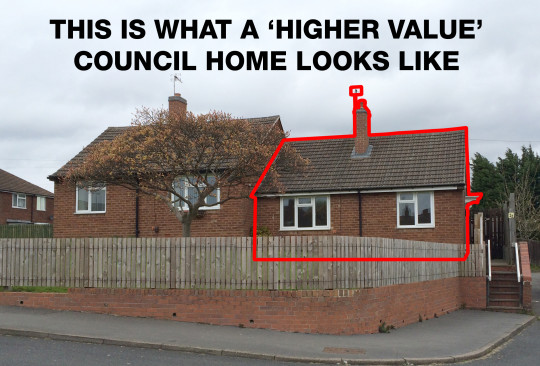
The Housing and Planning Bill is now nearing the end of its passage through parliament. It’s changed a lot since it was first tabled by the government, but one thing that’s still included is the proposal to raise billions of pounds each year by forcing councils to sell much-needed council homes.
This policy will see councils forced to sell so-called ‘higher value’ council homes to the highest bidder and hand the money they raise over to the Treasury.
There’s been scant detail from government about what the specific impact of this policy will be. Despite promises to share information with parliament as early as possible and talk of collecting a bucket-load of data, government still has given next to no indication of which councils will be forced to sell homes and how many.
As the Public Accounts Committee put it recently “Parliament and the public are being asked to take a leap of faith about how this will stack up financially, and that is completely unacceptable.”
To fill this information gap we – and other organisations like Savills and the Joseph Rowntree Foundation – have put a lot of work into researching and explaining what the potential effects of the policy could be. Our previous research that we released last year warned that some areas will be incredibly hard-hit by this policy, forced to sell thousands of homes to the highest bidder.
And earlier last week we released some further research on what those effects could be, if the burden is spread more evenly across the country. The huge number of homes that may be sold off, and the sheer amount of money that councils may have to hand over to the Treasury, grabbed the headlines.
But for me the most important story isn’t about the big numbers – it’s about the actual homes that will be sold and the people who will miss out on living in them. Because if the government want to raise £4.5 billion a year by selling off council homes, and chose to spread the burden right across the country, they have to sell off homes in some areas that are relatively cheap – homes that are ‘higher value’ in name only. This is why the government amended its own bill to change ‘high value’ to ‘higher value’. Two letters that make all the difference, as Jules Birch explains.
To investigate this point properly we focussed in on Dudley in the West Midlands. Our modelling suggests that under the scheme Dudley Council would be forced to sell any one-bed property they own that’s worth more than just £76,000 when it becomes vacant, precisely is because the general value of the council’s homes is relatively low.
Table 1: implied thresholds for sale in Dudley
| 1 bed | £76,000 |
| 2 bed | £95,000 |
| 3 bed | £111,000 |
The one-bed bungalow in the pic above is comfortably worth more than that £76,000 threshold. A quick search for other similar private properties nearby show them changing hands for upwards of £100k.
But this is a council home that was recently vacated and being advertised through Dudley Council’s choice-based lettings website. It’s exactly the sort of home that would be hit by the forced sales policy and subject to sale if it was empty again in the future. (Interestingly, this is also in line with the Joseph Rowntree Foundation’s findings that bungalows will be particularly badly affected).
Speaking to one of the bungalow’s neighbours, they couldn’t believe that Dudley Council would be forced to sell off a home like this. ‘They can’t sell it’, she said, ‘it’s for pensioners’. And she was absolutely right: it’s on a quiet cul-de-sac in a close community where people look out for one another. It will make a perfect home for someone who needs a bungalow.
It’s devastating to me to think that a modest home like it could be sold off to the highest bidder instead of going to one of the 2000+ people waiting for a home on Dudley’s housing waiting list. Not only would it mean that all those people will be left waiting longer for a home, but if they do ever get a council home the one they end up with is less likely to suit their needs.
The Housing and Planning Bill will soon be law, but key parts of it are still being negotiated. At the very least, the amendment to make sure that any council homes sold off can be replaced on a like-for-like basis must be included in the final version of the bill.

The point is well made house prices must be maintained in any way possible. Obviously banker’s profits are more important than communities and homes for pensioners